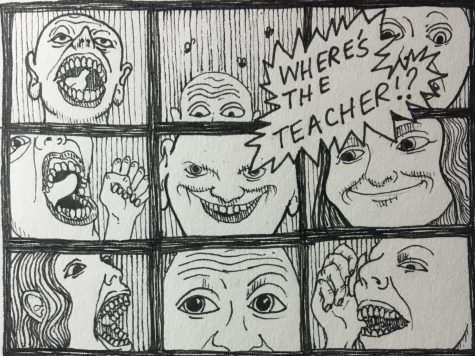Out of Control with Charlie Warren
Art is a nebulous thing. What it is, what it accomplishes, and what purpose it serves in the grand schema of society are questions that can only be answered on an individual basis. For me, art is emotion; it captivates the mind, engages the soul, and transcends sensory experience. Each and every artistic medium captures and reflects human emotion in a different way, making each one of them valuable in their own right. Superlatives and personal insights aside, we can all agree that art is pretty neat, right? Well, dear reader, since you happened to have opened this article in the Arts & Entertainment section of the Wolfpacket, then chances are that you think so, too. Great! Coincidentally, it also just so happens that my purpose in this article will be to discuss video games, that wonderful artistic medium that I have discussed on so many occasions with In Control. Moreover, I intend for this particular piece to shed light on the medium of video games by seeking to answer a question that is at once straightforward and nuanced: what makes a video game good, or for that matter, great?
As previously mentioned, I have written for In Control for quite a while. A quick perusal of the archives shows that my first game-related article was published on November 5, 2018, though the title “In Control” made its debut in the February 14, 2019 issue. Needless to say, this column has evolved a lot since then. The articles that I published two-and-a-half years ago were a mix of review pieces and analyses of gaming in pop culture. Until recently, I had looked back on these articles as less sophisticated than some of the articles I have written this year, which have sought to analyze the relationship between game and player. This harmful and somewhat self-defeating paradigm was shattered when I took a step back and realized something crucial: my articles, much like the video games I analyze, have purpose in context.
What I mean by this is that some of my early articles (e.g. “Give This God a Place in Smash,” “The Swift Revival of Pokémon Go,” and “The Shady Legacy of the SouljaGame Console”) are fun, quickly consumable experiences. They go into depth about one aspect of gaming culture that I wanted to communicate to the readers of the Wolfpacket, and once the reader has experienced the article in full, they can walk away entertained and informed. On the opposite hand, this year’s articles (e.g. “Nostalgia in games,” “Beauty lies in the eye of the controller,” and “Among friends”) are meant to provoke a deeper level of thought within the reader by analyzing how games impact their audiences. Likewise, video games have evolved from fun experiences to thought-provoking adventures. This begs the question: is one of these styles better than the other?
Well, no. As previously established, art’s myriad interpretations render most objective rankings useless. What may be fun, meaningful, and beautiful to me may be dull, uninspired, and bland to the next person. I tend to prefer games that have a good amount of world-building and diverse gameplay mechanics, but I also like playing games like “Mario Kart,” which does not fall under either of the above descriptors. Personal preference is the one true factor that determines a game’s value. Understanding what goes into shaping your personal preference and the preferences of others is of the utmost importance in understanding and accepting different viewpoints. Just as I had to reflect on why I liked my recent articles more than the articles I had written years ago in order to adopt a more healthy paradigm on my role as a columnist, I think that it would do a lot of good for those involved in gaming (or even those looking into the gaming community from the periphery) to take a moment and think about why they like the games they do.
For me, my favorite games will always be defined in relation to a couple of key questions. Is this game similar to/have a connection to what I played while growing up? Am I engaged by the gameplay, story, and music of the game? Is this game an extension of my real-life interests? If a game meets some of the parameters outlined by these questions, chances are that I will enjoy it. For instance, my favorite game of all time, “Mother 3”, meets all of these conditions. Although I only played it for the first time a few years ago, I have a nostalgic connection to “Mother 3” because Lucas (the game’s main character) has been my favorite character in the “Smash Bros”. series since I was much younger (hence, a childhood connection). Furthermore, the gameplay is thoroughly engaging, the storyline is at once heart-wrenching and hilarious, and the music is out-of-this-world amazing. Lastly, “Mother 3” serves as an extension of my passion for reading through the game’s witty writing, which I would relate here if not for the fact that I want you to go out and experience it for yourself.
Though the three questions above help to explain why I like the games that I do to you, they are still an imperfect representation of personal preference. There are games that I thoroughly enjoy despite meeting only one of the questions, let alone all three. That does not make me a hypocrite, it just means that defining what makes a game good is hard. As such, it is saddening to see people on the internet attack people for liking games that they see as “childish,” “boring,” lame,” or some other (much more vulgar and crass) insult. These denizens of the internet forget that personal preferences are, well, personal. Unfortunately, it is far too easy to write off this group as a vocal minority of the gaming community who do this, when in reality, the issue is much more endemic than what first meets the eye. Gamers are oftentimes quick to gatekeep certain titles that they perceive to be unworthy of attention since they fail to meet their personal criteria for what defines a game. This gatekeeping is disproportionately directed towards one particular type of video game: mobile games.
Mobile games are specifically designed to be consumed in brief bursts; waiting in line, riding the subway, and other activities that take 5-10 minutes of your time are prime time for mobile games. If someone gets into gaming through mobile games after they realize that it might be an enjoyable way to pass the time, then they should be allowed to do so because they are having fun! These games are still valuable and have artistic meaning since they are conveying the emotion of fun. Sure, “Doodle Jump” is not a 100-hour RPG that forces the player to rethink their purpose in the world, but it does not have to be. So long as people enjoy it, it is a good game.
This rule holds true for literally any type of game out there. If you enjoy it, then the game is good and it has at least some artistic value. However, if you really enjoy the game because it lives up to (and possibly exceeds) the expectations for a game set by your personal preferences, then you have found a great game that will live on in your mind as a valuable piece of art. The pieces of art that you collect along the way as you play more and more games will build up, slowly but surely. You are the curator of your own mental museum, deciding which games to feature more prominently in your psyche based on how much enjoyment you derived from each game. Chances are that the pieces that you exhibit will change over time as your personal preferences evolve.
As a little bit of a fun thought experiment, I challenge you, the reader, to do this: make a top 10 game list! Pull out a pencil and a piece of paper and make it happen. Try not to think too hard about your choices; just write down the first things that come to mind. Alright, have you finished? Awesome! Here is my list:
“Mother 3”
“EarthBound”
“Super Mario Galaxy”
“The Legend of Zelda: Breath of the Wild”
“Hollow Knight”
“Super Smash Bros. Ultimate”
“Celeste”
“Undertale”
“Xenoblade Chronicles: Definitive Edition”
“Mario Kart Wii:
Thank you for humoring me with that. Actually, thank you all for everything. Thank you to anyone who has read a single word of what I have written over the past three years for this column, it has been an immense honor and privilege to write down my thoughts on games for you all. This is my last In Control column, and this is the last paragraph of that column. If you hold onto anything that I have mentioned in this article or any of the others, remember this: you are in control, so make the most out of every moment.
Hello there! Our goal is to provide relavent, engaging journalism for readers of all ages. Your donation will support the student journalists of the Wolfpacket at Claremont High School, and will allow us to purchase equipment, print our monthly issues, and enter in journalism competitions. We appreciate your consideration!

Charlie Warren is a senior at Claremont High School, where he is currently an assistant sports editor with the Wolfpacket. In terms of extracurriculars,...







